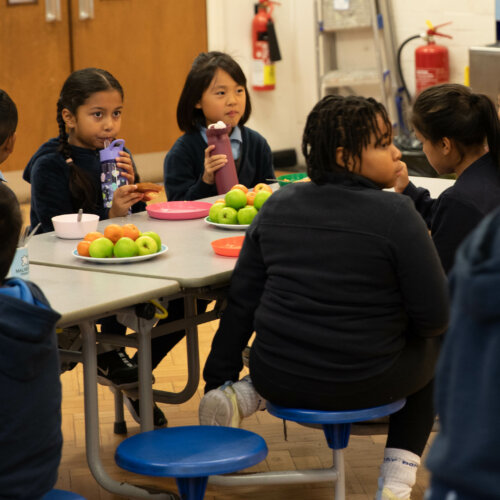Celebrating a positive partnership between Magic Breakfast, Impact on Urban Health and School Food Matters
We are delighted to announce that a collaborative project between Magic Breakfast, School Food Matters and Impact on Urban Health (IoUH) was nominated and shortlisted for the Health and Nutrition Award at the Public Sector Catering Awards 2023.
The project, developed by IoUH, aimed to improve children’s health and nutrition through a stigma-free, universal school breakfast offering. The pilot was delivered by Magic Breakfast and School Food Matters in ten schools across Southwark and Lambeth, two inner London boroughs. At Magic Breakfast, collaboration is at the heart of how we work and we want to take this opportunity to celebrate this great example of positive partnership in the sector! Let’s take a look at some of the highlights and successes of the pilot.
What were the aims of the breakfast pilot?
The main aims of the pilot were from IoUH’s long-term Children’s Health and Food Programme which focuses on making positive changes to public food environments so all children can access a nutritious diet, regardless of where they grow up. The aims of the project were:
- Improving the nutritional intake of school children
- Offering more variety and choice at school breakfast settings
- Feeding more vulnerable children at risk of hunger
By learning what works to change food environments in Lambeth and Southwark, IoUH hope to reduce obesity and malnutrition rates and influence others to take up successful approaches more widely.
Why is this needed?
In the UK children and young people growing up in areas with high disadvantage have worse health outcomes. In England, almost 1 in 4 children are living with obesity by the time they leave primary school, a number which has been increasing over the last decade. This is significantly worse for those living in the most deprived areas, where you are twice as likely to be living with obesity than those in the least deprived areas. It is also a major challenge in London, which out of any global city, has the highest rates of childhood obesity.
Food insecurity and an inadequate food landscape are two factors driving these health outcomes. In the UK, healthy foods costs 3x as much as unhealthy foods, and ‘food deserts’ in some areas make accessing quality, fresh food difficult. Right now, in the UK 4 million children are at risk of hunger.
How was the pilot delivered?
Beginning in February 2022, each participating school was tasked with delivering a healthy, universal daily breakfast, free of charge to pupils and accessible to all who wanted to attend. To support this, schools were provided with a tablet and access to an online portal through which they could order food direct to their doors. Staff were provided with training and personalised support from Magic Breakfast and School Food Matters. Schools also received grants to cover the set-up costs of expanding breakfast provision, such as extra staffing, toasters and fridges.
Breakfast at school can look very different depending on the capacity, staffing and needs of each school community. With this in mind, healthy menus were designed to cater for the needs of each school setting, from sit-down breakfast clubs in a canteen to classroom and playground breakfasts. The menus met national School Food Standards and recommended nutrition guidelines for primary school children.
Most importantly, the foods available made breakfast colourful, varied and exciting, giving children valuable opportunities to try new foods and adopt healthy eating habits.
“We get to have variety and we don’t always have the same stuff repetitively”
– Pupil feedback from the pilot.
What did the pilot achieve?
An independent evaluation of the pilot identified many positive outcomes, including:
- increased attendance at school breakfast settings
- an improvement in the quality of the food served
- children feeling full and energised after eating a school breakfast
- and positive shifts in healthy eating habits for both children and school staff.
The evaluation also highlighted the importance of expert advice and individual support for schools, to ensure as many children as possible were able to access a free, healthy breakfast.
By the time the pilot was well underway, there was a positive awareness amongst school staff and the children themselves regarding what a healthy, balanced breakfast looks like.
“Children used to have more and more toast with honey or jam when they were hungry…now they have a balance of carbohydrates, fruit and yoghurt.”
– Breakfast Club staff
What next?
These learnings are crucial for understanding how schools can support children’s health, nutrition and learning through free, universal school breakfast provision.
The success of the pilot highlights the important role the collaboration can have in delivering healthy food for children and provide learnings that can be used by Governments and local authorities to ensure any investment in school breakfast provision maximises its impact for vulnerable children.
“If they have a full belly and a balanced breakfast, we have happy children and more focus in the classroom.”
– Head of Catering, pilot school






